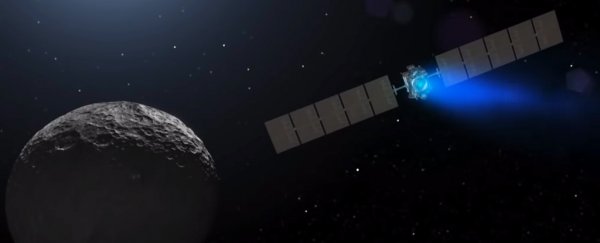Just days after we learned about the demise of the Kepler telescope, another NASA mission has come to an end.
Tens of thousands of kilometres above the largest object in the asteroid belt, the cold body of a Dawn spacecraft now orbits in silence.
Having missed several scheduled communications, the probe has been declared out of action, officially putting an end to its quest.
"Today, we celebrate the end of our Dawn mission – its incredible technical achievements, the vital science it gave us, and the entire team who enabled the spacecraft to make these discoveries," says NASA's Science Mission Directorate associate administrator, Thomas Zurbuchen.
Launched in September 2007, the Dawn mission set out to study two of the largest bodies in the asteroid belt – Vesta and Ceres.
More than just fat asteroids, these so-called proto-planets represent an era in the Solar System's history when worlds like our own were formed. Data on their composition will provide researchers with decades of work as they continue to piece together the story of Earth's creation.
"The astounding images and data that Dawn collected from Vesta and Ceres are critical to understanding the history and evolution of our Solar System," says Zurbuchen.
Even before it arrived at Ceres, the spacecraft was capturing details of new phenomena that would challenge what we knew about these stunted planets.
The loss of the probe isn't a surprise. Dawn's positioning relied on electrically-tuned gyroscopes, which over the years experienced significant failures. In their place, the probe had to make use of its jets to steady its motion as it swooped down in a loop to take snapshots of the proto-planet's surface.
Several months ago, mission director Marc Rayman explained in detail how the Dawn spacecraft was running out of hydrazine propellant.
Without it, the craft could no longer reposition its solar panels to charge its circuits and direct its main antenna back to Earth.
"The demands we put on Dawn were tremendous, but it met the challenge every time," Rayman said in homage to the silenced probe.
"It's hard to say goodbye to this amazing spaceship, but it's time."
Listen to Rayman talk about the mission in the clip below.

It's hard not to feel for the mission team. Rayman points out his car's license plate says "My other vehicle is in the main asteroid belt," giving you some idea of just how emotional these times must be for researchers.
There's something unique about our attitude towards space probes, something we don't tend to associate with ocean-faring robots or the myriad of satellites in our own planet's orbit.
We can't help but miss Curiosity's solitary humming of Happy Birthday to itself. There's a sad anticipation of the announcement of Opportunity's demise.
More than just anthropomorphised explorers, there's something profound in their isolation as they push the frontiers of knowledge so far from home.
Dawn might just be circuits circling a distant world. It's still okay to shed a tear and be thankful not just of its years of service, but of the efforts of the researchers who will also be mourning the end of a truly magnificent journey.
